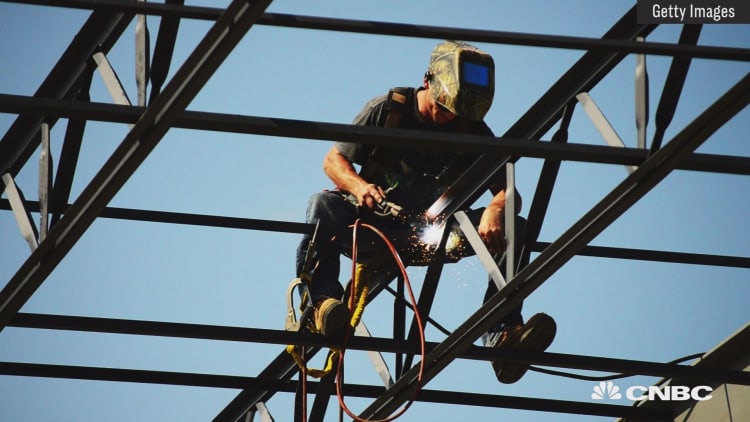
March rolled in like a lion, taking a big bite out of stock market gains, and it may be a sign of more to come as investors consider a more aggressive trade policy from the White House, analysts said.
Many strategists have been expecting the market to recover from February's lows without a retest, but this week's harsh sell-off has some rethinking the outlook. Stocks were already having a bad week before President Donald Trump announced new sweeping tariffs on steel and aluminum Thursday.
The Dow lost 420 points to 24,608 on the first day of March and was on track for a 2.8 percent decline for the week as of late Thursday. The plummeted below the key 2,700 level, dropping to 2,677, or 1.3 percent, in Tuesday trading. That sent up a warning that more technical damage could be ahead.
"The trade stuff is really new information," said Jack Ablin, CIO at Cresset Wealth Advisors. "One of the risks of the forecast was that we do end up getting into some sort of trade rift that undermines growth and profitability."
Fear of protectionist trade policies have been hanging over the market since the election, but so far minor skirmishes over Canadian lumber and South Korean washing machines have not had the impact or backlash seen by the latest tariffs.
There were immediate protests from trading partners, such as Canada, the biggest exporter to the U.S. of both metals, and the European Union. Republicans criticized the president's action, and there were immediate complaints from a wide range of industries, including autos, aerospace, chemicals and beverages.
"I know of no economist who is on record saying trade tariffs and trade restraints are good for economic growth," said Ablin. "While the downdraft was pretty technical the first time around, and I didn't see much fundamental blowback, this is more a new macro assumption. I think it will force me and other strategists to probably reassess."
Mark Luschini, chief market strategist at Janney Montgomery, said he has been expecting more selling and a retest of the February lows is possible. The tariff news adds to his expectation the market will sell off further.
"Whether we need to go to 2,530 remains to be seen," he said.
The S&P 500 held an important level at 2,659, according to Scott Redler, partner with T3Live.com.
Redler said a retest of the Feb. 9 low can't be ruled out. "We just had three down days since the bearish outside reversal on Tuesday. That was the day to reduce risk. So now it's hard to be short. But the buy the shallow dip has changed," he wrote in a note.
He said the S&P held its 100-day moving average "but we are in somewhat of no man's land."
The bond market, which has been a negative for stocks, saw a flight to safety trade Thursday, and yields moved lower both on the stock market sell-off and fears of a broader trade war. The 10-year Treasury yield slipped to 2.80 percent, after having reached 2.95 last week. Yields move opposite price.
Strategists said the idea of a trade war raises concerns about inflation, and in the case of metals, manufacturers of things such as beverage cans and automobiles could pass along the cost to consumers.
"The irony is this could result in more job losses than job gains. Boeing and any of the big heavy manufacturers have to be stamping their feet," said Ablin. Boeing ended the day down 3.5 percent in its worst day since Feb. 8, when it lost 5.3 percent.
Steel, however, did well. Cleveland-Cliffs, for instance, was up 10.2 percent.
Michael Feroli, J.P. Morgan chief U.S. economist, said the tariffs as they now stand should have little impact on the economy for now and no impact on the Fed's rate decision for March. Trump put a 25 percent tariff on imported steel and 10 percent on aluminum.
"More risks would obviously arise if this action were to initiate retaliatory action," he wrote, pointing to President George W. Bush's failed effort to put tariffs on steel in 2002.
WATCH: Tariffs could lead to unintended consequences



